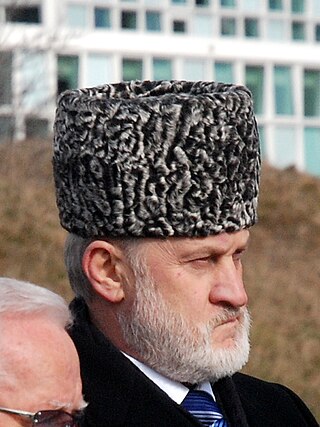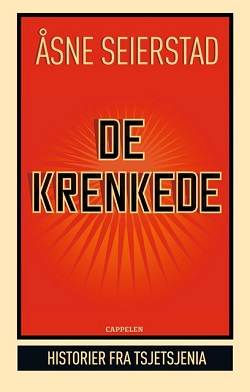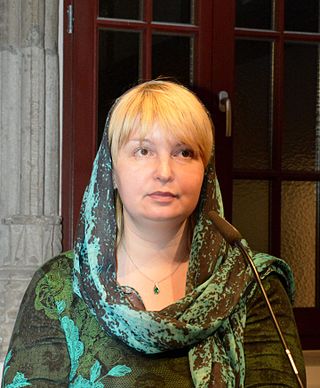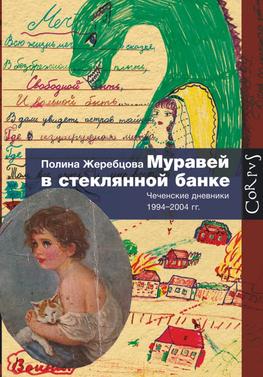
Chechnya, officially the Chechen Republic, is a republic of Russia. It is situated in the North Caucasus of Eastern Europe, between the Caspian Sea and Black Sea. The republic forms a part of the North Caucasian Federal District, and shares land borders with Georgia to its south; with the Russian republics of Dagestan, Ingushetia, and North Ossetia–Alania to its east, north, and west; and with Stavropol Krai to its northwest.

The First Chechen War, also referred to as the First Russo-Chechen War, was a struggle for independence waged by the Chechen Republic of Ichkeria against the Russian Federation from 11 December 1994 to 31 August 1996. This conflict was preceded by the battle of Grozny in November 1994, during which Russia covertly sought to overthrow the new Chechen government. Following the intense Battle of Grozny in 1994–1995, which concluded with a victory for the Russian federal forces, Russia's subsequent efforts to establish control over the remaining lowlands and mountainous regions of Chechnya were met with fierce resistance and frequent surprise raids by Chechen guerrillas. The recapture of Grozny in 1996 played a part in the Khasavyurt Accord (ceasefire), and the signing of the 1997 Russia–Chechnya Peace Treaty.

Akhmed Halidovich Zakayev is a Chechen statesman, political and military figure of the unrecognised Chechen Republic of Ichkeria (ChRI). Having previously been a Deputy Prime Minister, he now serves as Prime Minister of the ChRI government-in-exile. He was also the Foreign Minister of the Ichkerian government, appointed by Aslan Maskhadov shortly after his 1997 election, and again in 2006 by Abdul Halim Sadulayev. An active participant in the Russian-Chechen wars, Zakayev took part in the battles for Grozny and the defense of Goyskoye, along with other military operations, as well as in high-level negotiations with the Russian side.

The Second Chechen War took place in Chechnya and the border regions of the North Caucasus between the Russian Federation and the breakaway Chechen Republic of Ichkeria, from August 1999 to April 2009.

Åsne Seierstad is a Norwegian freelance journalist and writer, best known for her accounts of everyday life in war zones – most notably Kabul after 2001, Baghdad in 2002 and the ruined Grozny in 2006.

OMON is a system of military special police units within the Armed Forces of Russia. It previously operated within the structures of the Soviet and Russian Ministries of Internal Affairs (MVD). Originating as the special forces unit of the Soviet Militsiya in 1988, it has played major roles in several armed conflicts during and following the 1991 dissolution of the Soviet Union.

The Bookseller of Kabul is a non-fiction book written by Norwegian journalist Åsne Seierstad, about a bookseller, Shah Muhammad Rais, and his family in Kabul, Afghanistan. The book was published in Norwegian in 2002 and English in 2003. The story takes a novelistic approach, focusing on the characters and detailed aspects of their lives and the difficulties they face. The author's account was later contested, she was sued for defamation, and the family had to leave the country.

In Chechnya, mass graves containing hundreds of corpses have been uncovered since the beginning of the Chechen wars in 1994. As of June 2008, there were 57 registered locations of mass graves in Chechnya. According to Amnesty International, thousands may be buried in unmarked graves including up to 5,000 civilians who disappeared since the beginning of the Second Chechen War in 1999. In 2008, the largest mass grave found to date was uncovered in Grozny, containing some 800 bodies from the First Chechen War in 1995. Russia's general policy to the Chechen mass graves is to not exhume them.
In June 2000, the North Caucasian Chechen separatist-led Chechen insurgents added suicide bombing to their tactics in their struggle against Russia. Since then, there have been dozens of suicide attacks within and outside the republic of Chechnya, resulting in thousands of casualties among Russian security personnel and civilians. The profiles of the suicide bombers have varied, as have the circumstances surrounding the bombings.
Shakhid Raduyevich Baysayev was a Chechen civilian who was forcibly disappeared after being detained by Russian special police forces on the outskirts of Grozny, Chechnya on 2 March 2000. His body was never found.

Angel of Grozny: Inside Chechnya is a book by Norwegian journalist Åsne Seierstad published in 2007, which gives an account of everyday life in the war-torn Russian Republic of Chechnya. The book was also printed under the title Angel of Grozny: Orphans of a Forgotten War.

The 3 Rooms of Melancholia is a 2004 Finnish documentary film written, directed and co-produced by Pirjo Honkasalo. The film documents the devastation and ruin brought on by the Second Chechen War, more specifically the toll that the war had taken on the children of Chechnya and Russia.
Zarema Sadulayeva was a Russian children's activist and head of the aid organization Let's Save the Generation, based in Chechnya. She and her husband, Alik Djabrailov, were found murdered in August 2009.

Polina Zherebtsova's Journal: Chechnya 1999-2002 is the edited diary kept by Polina Zherebtsova while she was living in Grozny, the capital of the Chechen Republic. It was published in September 2011 in Russia. Zherebtsova wrote the diary when she was 14–17 years old, from the beginning of The Second Chechen War until December 2002. It tells the story of ethnic relations between Russian and Chechen peoples and of the lives of civilians during the war. This book is non-fiction, but real names were changed by the author in the book.

Polina Zherebtsova is a Chechen Russian diarist and poet. She's the author of Ant in a Glass Jar, covering her childhood, adolescence and youth that witnessed two Chechen wars.
Filtration camps, also known as concentration camps, were camps used by the Russian forces for their mass internment centers during the First Chechen War and then again during the Second Chechen War.

Ant in a Glass Jar: Chechen Diaries 1994–2004 (Russian: "Муравей в стеклянной банке. Чеченские дневники 1994–2004" is a 2014 documentary book that is an author's diary about the years spent in Chechnya from 1994 until 2004. It was written by Polina Zherebtsova, while she was 9–19 years old.

Petronėlė Lastienė née Sirutytė was a Lithuanian teacher and university professor. She was recognized as one of the Righteous Among the Nations for rescuing Jewish children from the Kaunas Ghetto during the Holocaust.

Anti-gay purges in Chechnya, a part of the Russian Federation, have included forced disappearances, secret abductions, imprisonment, torture and extrajudicial killing by authorities targeting persons based on their perceived sexual orientation, primarily gay men. At least 2 of the 100 people, whom authorities detained on suspicion of being gay or bisexual, have reportedly died after being held in what human rights groups and eyewitnesses have called concentration camps.
On the early morning of August 11, 2009, the bodies of Zarema Sadulayeva and Alik Dzhabrailov were found in a car trunk on the outskirts of the Chechen Capital of Grozny. Their bodies had traces of many bullets. Zarema Sadulayeva and Alik Dzhabrailov were kidnapped a day earlier, August 10 afternoon, from their work place, the office of non-profit organization Save the Generation, located in Grozny.














